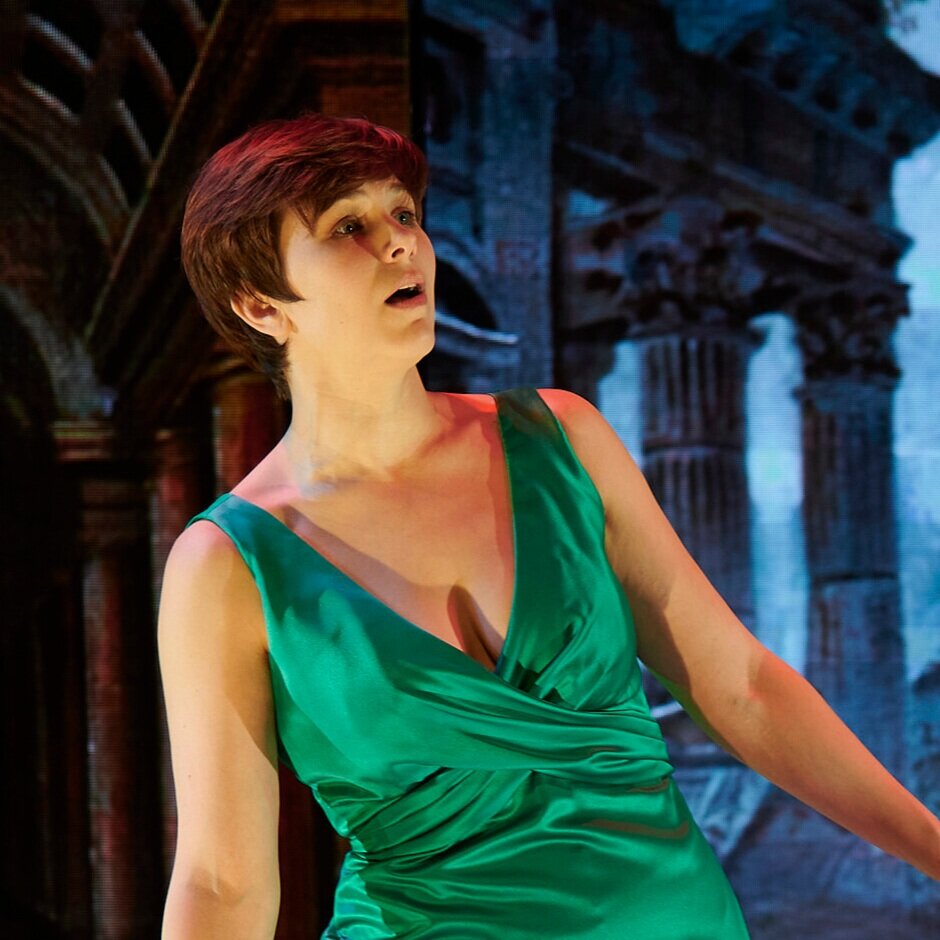Erica Schuller
Praised for her "lively personality, abundant charm, and luscious vocalism" and "crystalline voice," soprano Erica Schuller is a versatile performer, recognized for bringing committed artistry to a broad musical repertory. Her affinity for Baroque repertoire has brought her increasing attention from some of the country's finest Early Music ensembles.
This past season, Ms. Schuller reprised her role as Vespetta in Telemann’s Pimpinone with Haymarket Opera to great acclaim. Her performance was described as “show stealing” by Chicago Classical Review. In a departure from Baroque music, Ms. Schuller made her debut with Odyssey Opera in Boston, performing the role of Erasto/Amore in Gluck’s Paride ed Elena. She was hailed as “brilliant” by The Boston Music Intelligencer and “an absolute delight” by EDGE Media Network. The previous Spring she joined Apollo’s Fire for their tour of a semi-staged production Monteverdi's Orfeo, singing the roles of La Musica and Euridice. Her performances were praised as "powerful" and "radiant."
This season she will appear as a featured soloist with Apollo’s Fire in Cleveland for their February project, “Love in Venice.” Recent projects of note include performances with Apollo's Fire, The Boston Early Music Festival, Ars Lyrica Houston, New Trinity Baroque Orchestra, Great Lakes Baroque and The Lincoln Trio.
Additional past performances include the roles of Juno in Marai’s Ariane e Bacchus, Oriana in Handel's Amadigi di Gaula, Vespetta in Telemann's Pimpinone and Lisetta in Scarlatti’s Gli equivoci nel sembiante, all with The Haymarket Opera Company; Livietta in Pergolesi’s Livietta e Tracollo with the Boston Early Music Festival; Marzelline in Beethoven’s Fidelio and Soprano 2 in Glass’s Hydrogen Jukebox with Skylight Music Theater; she created the roles of Joan Strasinsky and The Princess for the world premiere of The Snow Dragon, by award winning novelist and composer Somtow Sucharitkul; Elvira in Rossini’s L’italiana in Algeri and Second Woman in Purcell’s Dido and Aeneas with The Florentine Opera Company.
As a concert soloist, Ms. Schuller has appeared with Apollo's Fire, Ars Lyrica Houston, New Trinity Baroque, Great Lakes Baroque, Milwaukee Symphony Orchestra, San Francisco Bach Choir, San Francisco Chamber Orchestra, Elgin Symphony Orchestra, Second City Musick and Bella Voce.
In addition to her work on the stage, Ms. Schuller can be heard as the voice of Marte in Duron’s Salir el Amor del Mundo, recorded for Dorian Record Label with Richard Savino and El Mundo. She can also be heard on the Boston Early Music Festival's Grammy-nominated recording of Lully’s opera Psyché.
Originally from Wisconsin, Ms. Schuller received her Master of Music from the San Francisco Conservatory of Music, and holds degrees in Vocal Performance and Music Education from the Eastman School of Music. She currently lives and teaches in Chicago.
Hear Erica as Dafne in Apollo e Dafne - Get your tickets now!
Q&A with Erica Schuller
Q: Who are you singing? Tell us about your character?
ES: I'm singing the role of Daphne in Handel's Apollo e Dafne. Like many other Handelian heroines, Daphne is headstrong and self possessed. She is a follower of Diana, Greek goddess of animals and the hunt. Diana was famously chaste, as were her followers. Daphne is committed to her calling as a follower of Diana, and refuses the advances of the god Apollo. Despite his threats and protestations of love, she remains true to herself and her values.
Q: What do you love about the opera?
ES: Handel writes wonderful roles for women. Far from being one dimensional, he fleshes out his female character, sometimes even more than the male ones. The musical writing is beautiful, and it's a thrill to portray a female character who doesn't wilt like a violet the moment a man comes along!
Q: Is there something about your character or this opera that modern audiences can relate to?
ES: Daphne's confrontation with the aggressive advances of Apollo are absolutely a reflection of the "Me Too" movement. Here we have an overly forward man pointedly pursuing a woman he finds attractive. Her refusals are ignored - she has to literally change herself into a tree to escape his advances, paralyzing herself in the process. She is a personification of the rage, grief and fear that women feel every day, knowing that at any moment they may have to defend themselves against unwanted sexual attention.
Q: Favorite aria/chorus from the piece?
ES: I love the overture!
Q: What is it like to prepare for film? Are you ready for your close-up?
ES: I have complete faith in Craig, Chase and the entire artistic team. I know they will do everything possible to help us look great on film!
Q: These operas center around a theme of forced transformation. How has the pandemic forced you to change? Have there been any silver linings?
ES: The pandemic has really affected my ability to teach, and I've had to learn how to be an effective instructor when not face-to-face with my students. The bright side is that I am home more, so I've been able to foster kittens and undertake projects that normally would have been too time-intensive before.
Q: On the topic of rep from the Age of Enlightenment, do you have a dream role? Is there an opera you wish audiences could hear? Do you love Handel? If you could steal any role from another voice type what would it be?
ES: Handel is one of my favorite composers. A dream role for me would be Cleopatra, from Giulio Cesare.
Q: As it’s Haymarket’s 10th anniversary, do you have a favorite Haymarket memory?
ES: I think my favorite memory is when Craig jumped on Ryan's back for his bow after Pimpinone.
Erica Schuller stars as Dafne in Haymarket’s filmed performance of Handel’s “Apollo e Dafne.” Photo: Anna Cillan


